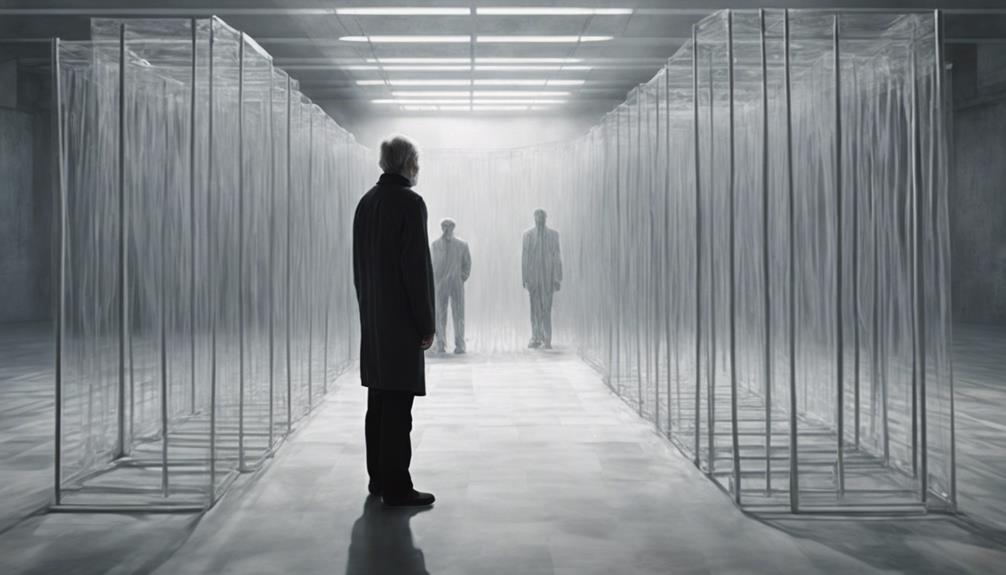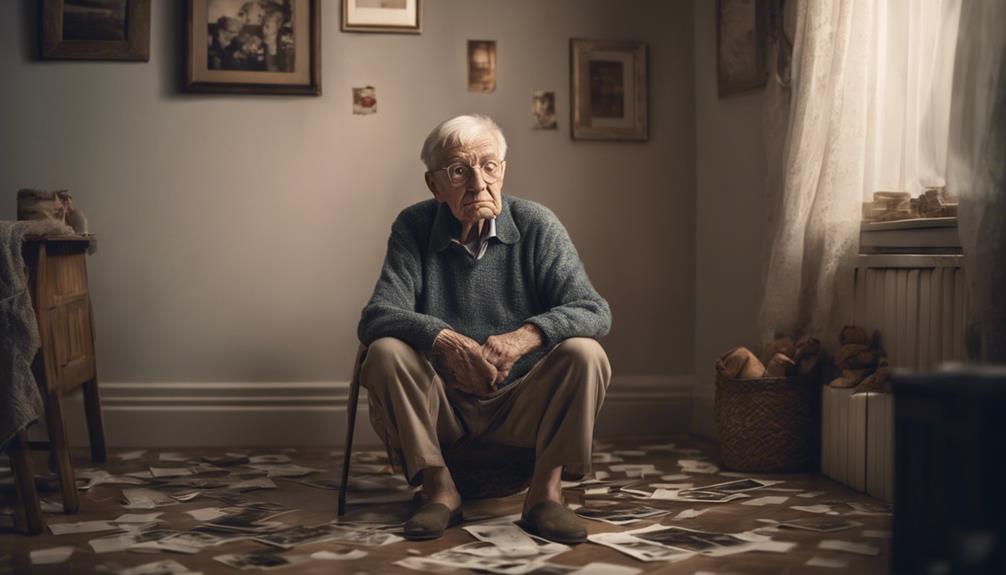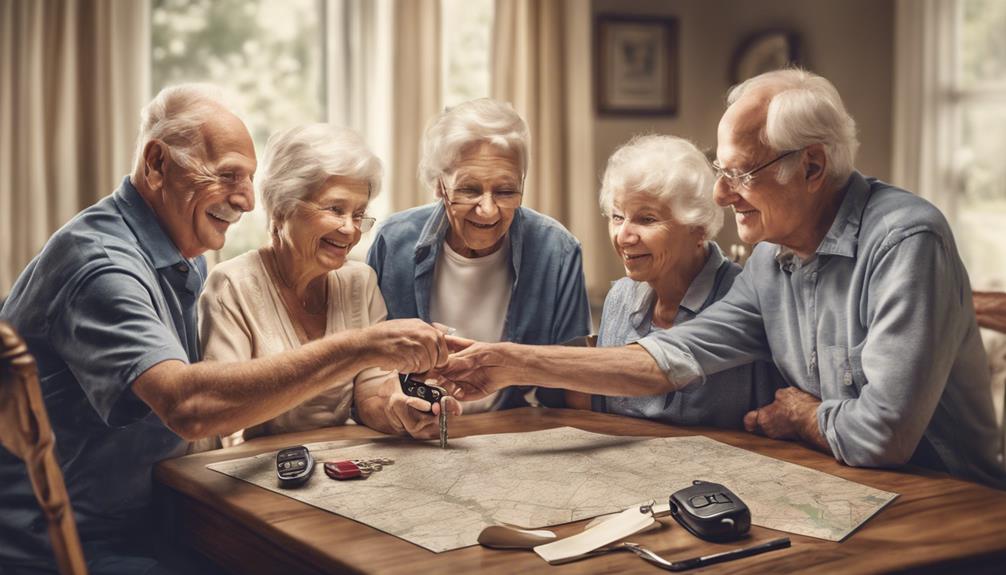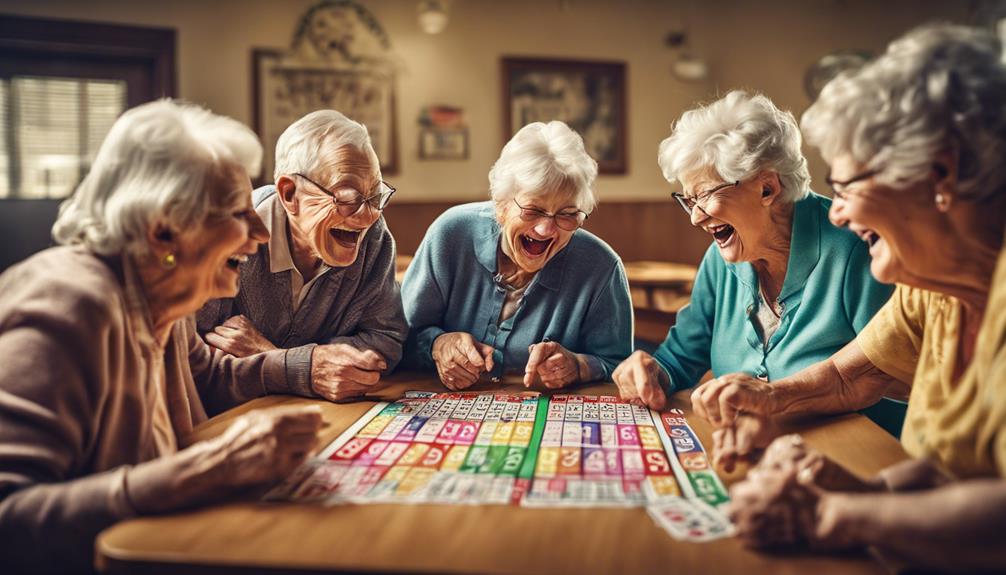Disenfranchised grief occurs when our feelings of loss are not acknowledged or embraced because they do not align with traditional standards. This lack of validation can lead to feelings of isolation and intensify our sadness. In some cases, society may struggle to comprehend the reasons behind our sorrow or may even criticize it, further deepening our pain. Various life circumstances, such as non-traditional relationships or taboo deaths, can evoke this form of grief. Educating ourselves about disenfranchised grief can empower us to provide better support for ourselves and those around us during challenging moments.
Key Takeaways
- Disenfranchised grief lacks societal recognition and support for unconventional losses.
- It includes taboo deaths, non-traditional relationships, or unacknowledged forms of loss.
- Society's failure to validate this grief intensifies emotional distress and hinders coping.
- Disenfranchised grief leads to isolation, psychosomatic illnesses, and potential substance abuse.
- Understanding diverse forms of disenfranchised grief is vital for providing proper support and validation.
Understanding Disenfranchised Grief
Disenfranchised grief occurs when societal norms fail to recognize and support individuals experiencing losses that fall outside conventional boundaries. This type of grief is often overlooked or misunderstood, making it challenging for those going through it to receive the necessary social support.
When someone is experiencing disenfranchised grief, they may be dealing with a loss that society doesn't fully acknowledge or validate. This could be due to the nature of the loss, such as the end of a non-traditional relationship or a taboo death, which can lead to feelings of isolation and a prolonged grieving process.
Without the proper social support, individuals experiencing disenfranchised grief may struggle to process their emotions and navigate through their loss effectively. The lack of recognition from society can intensify their emotional reactions and hinder their ability to cope with the grief they're facing.
It's important to understand the nuances of disenfranchised grief to provide the necessary support and validation to those who are going through this challenging experience. Disenfranchised grief refers to grief that is not recognized or validated by societal norms, often leaving individuals feeling isolated in their mourning. Those experiencing this type of grief may find it difficult to move through the traditional stages of loss, including the bargaining phase of grief, where they grapple with “what if” scenarios. Offering empathy and acknowledgment ensures that their pain is seen and understood, even if it doesn’t fit conventional expectations of loss.
Social Stigma in Grieving
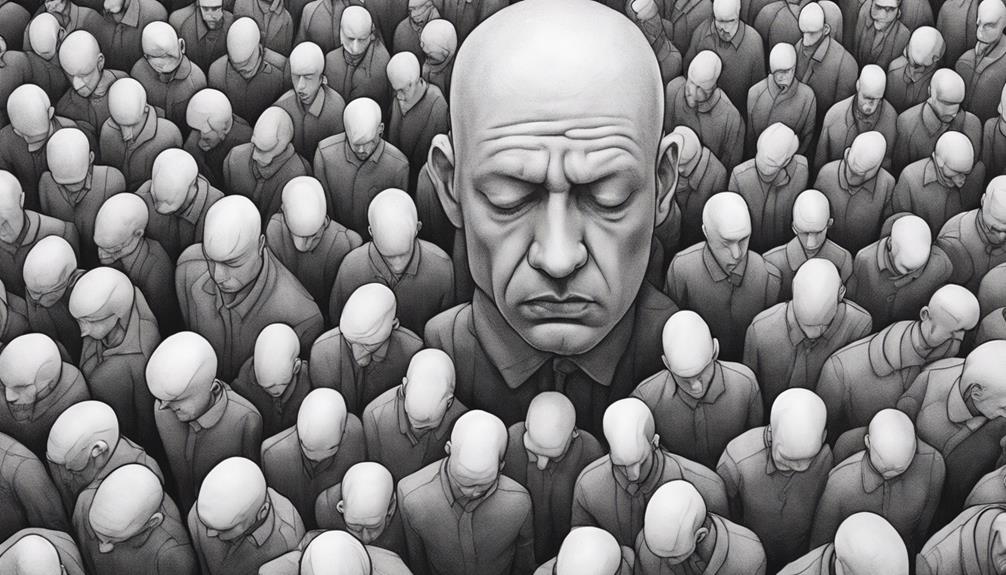
Social stigma in grieving involves societal disapproval or lack of acceptance towards certain forms of grief. This can lead to judgment, isolation, or invalidation of the grieving person's emotions.
Understanding and addressing these challenges is essential in supporting individuals experiencing stigmatized grief.
Stigma in Grief
Experiencing stigma in grieving can profoundly impact one's emotional well-being and hinder the healing process. Social stigma in grieving refers to negative attitudes and beliefs surrounding how individuals express grief in society. This stigma can lead to feelings of judgment, isolation, and lack of support during the grieving process.
People may hide their grief, suppress emotions, or avoid seeking help due to this stigma. Such societal attitudes can prolong emotional pain, hinder healing, and negatively affect mental health. Overcoming stigma in grief involves promoting understanding, empathy, and acceptance of diverse grief experiences.
It's essential to create a supportive environment where individuals feel safe to express their grief without fear of judgment.
Social Perception Challenges
Traversing societal attitudes toward grief can present significant challenges for individuals mourning the loss of a loved one. When grappling with social stigma in grieving, one may encounter various obstacles, including:
- Societal norms that dismiss unconventional relationships and taboo circumstances of loss.
- Lack of support and understanding from the community, leading to feelings of isolation.
- Difficulties in finding social validation and support when grieving outside traditional norms.
- Societal pressure to conform to established grieving practices, contributing to feelings of alienation.
- Challenges in moving through the expectations imposed by traditional grieving norms, intensifying the sense of isolation and disconnection.
Triggers and Causes of Grief
Certain factors can set off disenfranchised grief, such as workplace environments that downplay loss or normalize it.
The nature of one's relationships, like those within the LGBTQ+ community or online connections, can also influence how grief is perceived.
When emotions diverge from what society deems acceptable, disenfranchised grief may arise, along with the lack of acknowledgment for taboo causes of death or non-death-related losses.
Grief Triggers
Grief triggers encompass various events such as the loss of a loved one, the end of a significant relationship, or a major life change. When facing grief triggers, recognizing the diverse situations that can evoke feelings of loss and sorrow is crucial. Consider the following examples:
- Sudden loss of a loved one, leaving a void in our hearts.
- A significant relationship ending, causing emotional upheaval.
- Major life changes like moving to a new place or changing schools.
- Traumatic events such as accidents or natural disasters that shake our sense of security.
- Financial struggles or health issues that impact our emotional well-being.
Understanding these triggers can help us navigate our grief journey with compassion and resilience.
Causes of Grief
Experiencing the loss of a loved one, a breakdown in a significant relationship, job insecurity, or health challenges can serve as triggers for grief. Other causes of grief can stem from major life changes, trauma, natural disasters, or financial struggles. Specific events like divorce, miscarriage, or relocation can also lead to feelings of grief.
Grief can arise from unmet expectations, unfulfilled dreams, or unresolved conflicts. Any significant change that disrupts a person's sense of normalcy can result in feelings of grief and loss. Understanding these triggers and causes of grief is vital in providing support and empathy to those experiencing such challenging times. It's essential to approach individuals with kindness and patience during their grieving process.
Types of Disenfranchised Grief
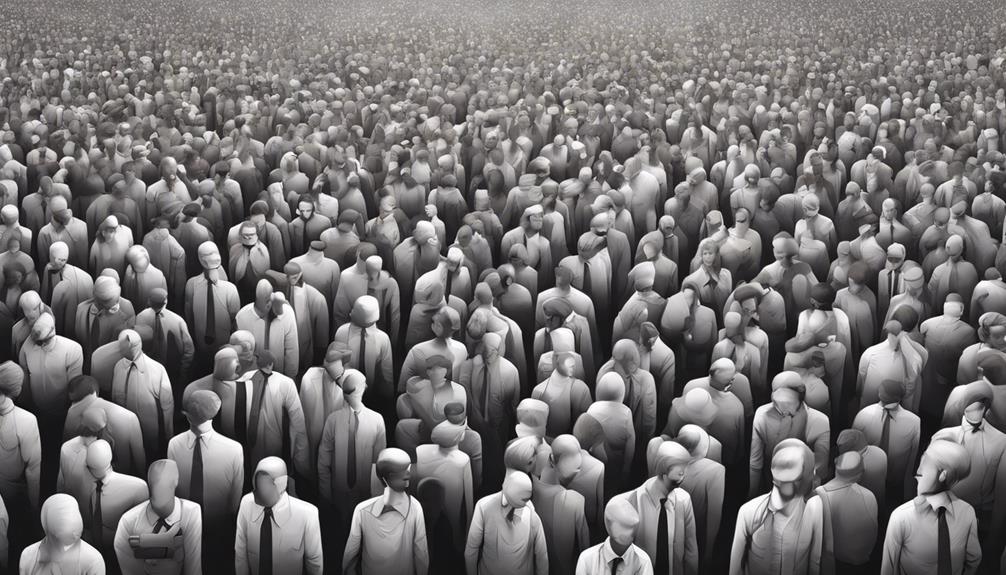
Within the domain of disenfranchised grief, various types manifest, each with its distinct characteristics and nuances. These types include:
- Ambiguous Loss: In this form of disenfranchised grief, individuals experience a loss where there's no closure or certainty, making the grieving process complex and challenging.
- Collective Disenfranchised Grief: Groups facing losses that aren't widely recognized or validated by society may experience this type of grief, feeling isolated in their mourning.
- Anticipatory Disenfranchised Grief: Individuals grieving losses before they happen encounter anticipatory disenfranchised grief, preparing emotionally for what's to come.
- Marginalized Disenfranchised Grief: Societal biases can lead to marginalized disenfranchised grief, where certain individuals' grief isn't acknowledged or supported due to systemic prejudices.
- Various Forms of Disenfranchised Grief: Beyond traditional bereavement, disenfranchised grief can take on many forms, highlighting the diverse ways individuals experience and navigate loss under societal constraints.
Emotional Impact of Disenfranchisement

The emotional toll of disenfranchised grief can have profound effects on individuals' mental well-being and social interactions. When grief is not acknowledged or validated by society, it can lead to various detrimental outcomes. Individuals experiencing disenfranchised grief may find themselves struggling with psychosomatic illnesses, where emotional distress manifests as physical symptoms. This can further exacerbate their suffering and make it challenging to cope with their loss. Moreover, disenfranchised grief often contributes to low self-esteem, as individuals internalize the feeling that their emotions are not worthy of recognition. Consequently, they may turn to substance abuse as a coping mechanism, further perpetuating a cycle of distress. Difficulty forming and maintaining healthy relationships is also a common consequence, as the unresolved grief can hinder meaningful connections. Understanding the emotional impact of disenfranchised grief is crucial in providing support and guidance to those navigating this complex experience.
| Emotional Impact | Manifestations | Effects |
|---|---|---|
| Psychosomatic illnesses | Physical symptoms without clear cause | Increased suffering and health challenges |
| Low self-esteem | Negative self-perception | Confidence and self-worth diminish |
| Substance abuse | Dependence on harmful coping strategies | Escalation of emotional distress |
| Healthy relationships | Struggles in forming meaningful bonds | Hindrance in building supportive connections |
Coping Strategies for Disenfranchised Grief

To effectively navigate disenfranchised grief, individuals can benefit from employing various coping strategies that promote healing and emotional well-being. Here are five coping strategies that can help individuals cope with disenfranchised grief:
- Seeking professional help: Grief counseling and therapy techniques like brainspotting can provide valuable support in processing complex emotions.
- Joining grief support groups: Connecting with others who understand the challenges of disenfranchised grief can offer validation and a sense of community.
- Practicing mindfulness: Engaging in mindfulness techniques can help individuals stay present and manage overwhelming emotions.
- Expressing emotions through creative outlets: Art or writing can serve as a therapeutic way to express and process grief.
- Engaging in self-care practices: Prioritizing self-care activities and seeking validation from support systems can promote healing and resilience in the face of disenfranchised grief.
Frequently Asked Questions
Which of the Following Would Be Considered Disenfranchised Grief?
Not recognizing the significance of a loss, society can cause disenfranchised grief. When a relationship isn't acknowledged, or grief lasts longer than expected, it can be labeled as complicated. This exclusion worsens the experience.
What Is the Disenfranchised Grief Model?
We comprehend disenfranchised grief as unacknowledged loss. It reveals societal gaps in support and recognition of various types of grief. For instance, losing a pet can trigger profound sorrow, often overlooked by others.
What Is an Example of a Disenfranchised Person?
We acknowledge disenfranchised grief as when society fails to acknowledge someone's loss adequately. An example is a person grieving a pet. Their sorrow may go unnoticed, causing prolonged pain and isolation. It's essential to offer support.
Which Type of Death Can Result in Disenfranchised Grief in Patients?
Certain deaths such as suicide, homicide, or drug overdose can lead to disenfranchised grief in patients. These losses are often stigmatized, making it challenging for individuals to openly mourn and seek support.
How Does Disenfranchised Grief Impact the 5 Stages of Grief?
Disenfranchised grief can complicate navigating grief stages insights. When the experience of loss is invalidated or not recognized by society, it can disrupt the natural progression of the 5 stages of grief. This lack of validation can hinder healing and make it difficult to move through the stages effectively.
Conclusion
Finally, disenfranchised grief is like a hidden treasure buried beneath society's expectations. It's a sorrow that goes unseen, yet its weight is felt deeply within.
By understanding the triggers, types, and emotional impact of disenfranchised grief, we can navigate this complex journey with resilience and grace.
Remember, grief is a natural part of life, and it's okay to seek support and find healthy ways to cope during difficult times.
